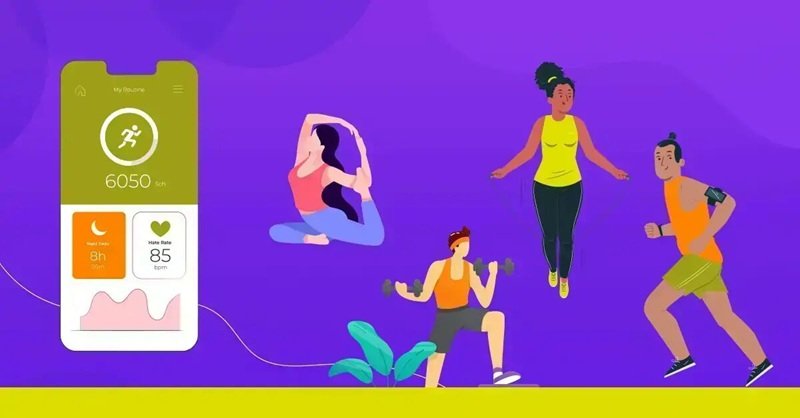Across India, from major cities like Mumbai and Delhi to smaller towns and rural areas, digital tools are reshaping the way people think about fitness and health. With smartphones becoming more affordable and internet access expanding rapidly, millions of Indians now rely on fitness apps, step counters, online workout videos, and wellness platforms to stay active — even with busy schedules.
This transformation isn’t happening only among professional athletes or fitness enthusiasts. Office workers, students, homemakers, gig-economy workers, and even retirees are turning to technology to manage their physical well-being. Understanding how these tools fit into everyday routines shows why digital fitness has become such a powerful trend.
Why fitness apps are booming in India
There are several reasons behind the growing popularity of fitness apps:
- Convenience: Workouts can be done anytime, anywhere.
- Low cost: Many apps offer free or affordable plans.
- Personalization: Users can choose routines based on level and goals.
- Tracking: Step counters and calorie logs help measure progress.
- Community: Challenges and group activities keep people motivated.
This combination of flexibility and motivation makes digital fitness appealing for people of all ages.
The rise of home workouts
Especially after the pandemic, home workouts have gained massive traction in India. People realized that they don’t always need a gym to stay healthy. With a bit of space — a living room, balcony, terrace, or even a bedroom — many routines are possible.
Popular home workout types include:
- Bodyweight training – push-ups, squats, planks, lunges.
- Yoga and meditation – widely followed through mobile apps and YouTube.
- HIIT sessions – short but intense workouts for busy professionals.
- Dance fitness – Bollywood-inspired workout videos are hugely popular.
- Stretching and mobility – for office workers and students who sit long hours.
These easy-to-follow methods encourage consistency, which is often the biggest challenge.
The importance of step tracking and movement goals
Step counters have evolved into an everyday tool for millions. Whether through a smartwatch, fitness band, or phone sensor, counting steps makes movement measurable.
Benefits of step-counting habits:
- motivates users to stay active throughout the day
- reduces sedentary time
- helps maintain weight goals
- creates a sense of achievement
- encourages friendly competition among family and friends
People often set goals like 5,000 or 10,000 steps per day. This simple metric has dramatically improved awareness about physical activity.
How Indians structure their digital wellness routines
A typical digital wellness routine blends several tools:
- Morning: yoga or stretching video
- Midday: step tracking and hydration reminders
- Evening: guided workout or walk
- Night: sleep monitoring and relaxation audio
Many users save useful links and platforms to revisit daily. These may include news sites, recipe blogs, wellness platforms, or general-purpose pages that fit personal browsing habits. In these collections, it’s common to see a mix of tools — for example, someone may keep Lucky Star casino bookmarked along with fitness trackers, productivity apps, and educational resources. Everyone builds their own digital environment depending on interests and lifestyle.
Nutrition tracking and mindful eating
Fitness apps have also popularized healthy eating. While India has a diverse food culture, keeping track of portions and nutritional balance can be challenging.
Digital nutrition tools help with:
- calorie counting
- macronutrient breakdown
- water-intake reminders
- healthy recipe suggestions
- linking meals to fitness goals
These habits contribute to long-term wellness rather than short bursts of dieting.
Mental wellness: an equally important aspect
Health is not only physical. Apps promoting meditation, breathing exercises, and stress-management techniques are becoming equally important.
Common digital mental-wellness practices:
- 10-minute guided meditations
- breathing routines during busy workdays
- sleep-relaxation music
- gratitude journaling apps
As stress levels rise in urban environments, these tools help individuals maintain balance.
How fitness apps motivate users through gamification
Gamification — turning progress into a game — has become a powerful motivator.
Examples of gamified features:
- badges for consistency
- weekly or monthly challenges
- leaderboards among friends
- reward points for completing steps
- visual progress charts
These features keep users engaged and excited about reaching new milestones.
Community-based fitness motivation
Indian fitness culture increasingly includes community spaces online:
- WhatsApp walking groups
- workplace fitness competitions
- neighborhood running communities
- online yoga meetups
- social-media fitness influencers
This sense of togetherness helps keep motivation high, even for beginners.
The role of tech in supporting women’s fitness
Women in India often juggle work, family responsibilities, and household tasks. Fitness apps give them flexibility and privacy, making it easier to stay active on their own schedule.
Women-focused features include:
- home workout plans
- menstrual cycle tracking
- post-pregnancy routines
- short, flexible exercise videos
- safe walking route trackers
These tools make wellness more accessible to women across different age groups and regions.
Preparing for the future: the next wave of digital fitness in India
The digital fitness ecosystem in India continues to grow. Several trends are shaping its future:
- more affordable smartwatches
- improved regional-language app support
- AI-powered custom workout plans
- integration with health insurance incentives
- virtual personal trainers
- better tracking accuracy
As technology evolves, maintaining a healthy lifestyle will become even more convenient for every household.
Final thoughts
Fitness in India is experiencing a digital revolution. With smart tools, creative apps, and increasing awareness, people are redefining how they care for their physical and mental well-being. Whether through structured workouts, step tracking, meditation, or personalized routines, fitness apps are helping millions build healthier habits — one small step at a time.



